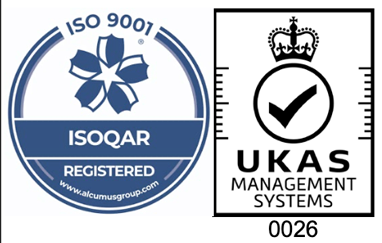Selecting the best rubber gaskets for oil rigs
26th October, 2025
Rubber for oil and gas industries must be engineered to suit different conditions and withstand extreme temperatures, high pressure and exposure to oil, gas and other chemicals.
Certain rubber products are best suited to the oil and gas industry, like rubber gaskets, which play a critical role in sealing and safety for oil rigs. They are used on oil rigs to prevent leakages in pipes, valves and other equipment to prevent the escape of oil, gas and other hazardous fluids and chemicals.
At Aquaseal Rubber, we manufacture a range of products for different applications on oil rigs, including rubber gaskets. With several appropriate materials to choose from, our rubber gaskets can be made to support our clients’ bespoke requirements to ensure oil rigs are ready for safe operations and optimal performance.
This guide will highlight what rubber gaskets are used for on oil rigs and why they are important, as well as the best materials to use, and their advantages.
What are rubber gaskets used for on oil rigs?
Rubber for oil and gas industries must be manufactured for use in applications where fluids or gases need to be contained under high pressures, temperatures and corrosive conditions.
An oil rig is a large structure built to drill into the earth’s crust and extract petroleum – or oil – and natural gas from beneath the seabed or, if it’s an onshore oil rig, beneath land. Oil rigs can be floating, mobile or fixed installations, designed for different conditions and water depths.
Oil rigs are a critical part of a complex operation which involves more than just drilling to extract oil. They are used to process and store oil or gas before transport and many oil rigs, especially offshore ones, are self-contained environments which provide housing and facilities for oil rig crews.
Therefore, rubber gaskets are a highly suitable option for use in the oil and gas industry.
Why are rubber gaskets important on oil rigs?
Rubber gaskets are primarily used in the oil and gas industry, like on oil rigs, to create reliable, pressure-tight seals. This will prevent enhance safety and maintain operations by preventing dangerous leaks which may impact the extraction, transportation or refining stages.
Pipeline sealing
In an oil rig, pipelines are essential for transporting fluids like oil and gas across long distances. To ensure the integrity of an oil rig’s pipeline system, rubber gaskets are used in pipeline joints, connectors and flanges since they can withstand high pressure, temperature and exposure to chemicals. By creating a leak-proof seal with rubber gaskets, the escape of fluids or gases and potential contamination is prevented.
Valves and pumps
A critical component in oil and gas operations, valves are used to control the flow, pressure and direction of fluids as they are moved from the well to the surface or through processing systems using pumps. Rubber gaskets are used to create tight seals between valve seats, covers and between pump components.
Pumps are critical in providing the appropriate mechanical force for fluid transfer, especially after natural pressure lessens, and valves are a crucial safety device to prevent hazardous backflow or overpressure.
Drilling equipment
For oil rigs in both offshore and onshore drilling procedures, rubber gaskets are commonly used in blowout preventers, pumps and drilling rigs. They help to ensure that seals are maintained in harsh conditions to prevent fluid leaks and uphold pressure integrity during drilling procedures.
Refining and chemical processing equipment
In an oil rig, reactors, heat exchangers and distillation columns play a crucial role in refining oil and processing chemicals. Should this equipment be faulty, it could cause extreme damage to the surrounding water or other areas if onshore. Using rubber gaskets in this equipment can ensure tight seals in these critical systems which handle corrosive chemicals, hot gases and other potentially hazardous substances.
Tanks and storage containers
Once oil and gases have been extracted, they need to be stored safely ahead of transportation to shore. Rubber gaskets are used to seal the covers and joints of tanks and storage containers storing crude oil, refined products and chemicals to ensure they do not leak or contaminate the environment.
Rubber gaskets also play a vital role in protecting extracted fluids against contamination from external elements like moisture and dirt.
What materials are used in rubber gaskets for oil rigs?
Certain rubber materials are better suited for use in oil rigs because of their resistance to high temperatures, pressure and chemicals, and their durability and longevity.
At Aquaseal, we can manufacture rubber gaskets in several materials to align with your requirements.
Nitrile
Nitrile is used in oil rigs because of its exceptional resistance to oils, fuels and petroleum-based fluids which prevents swelling and degradation of equipment to ensure a reliable and long-lasting seal in harsh environments.
Manufactured through the synthetic rubber production process, nitrile is used in oil rigs because of its ability to create strong bonds to maintain the flexibility and integrity of a rubber gasket.
Aside from rubber gaskets, nitrile is commonly used across other oil and gas applications. For example, the role of nitrile watertight seals in the oil and gas industry is critical for the safe operation of vessels and other structures.
Viton
Viton rubber is an ideal material for rubber gaskets on oil rigs, because it is resistant to chemicals, high temperatures and pressures.
However, viton is also weather and ozone resistance, meaning it can withstand the potentially harsh environmental conditions which applications on an offshore oil rig can be exposed to.
Viton is able to maintain elasticity under pressure, meaning it is a reliable material for sealing solutions where failure is not an option. The benefits of viton rubber make it a suitable choice for the oil and gas industry.
EPDM
EPDM is a common rubber material used for gaskets on oil rigs, but only for applications that do not involve contact with petroleum-based fluids, similar to silicone.
Suitable for water and weather resistance, EPDM rubber gaskets can be found in HVAC systems and potable water systems within living facilities for crew members working on oil rigs, but also for external flexible but tight and reliable. seals.
EPDM is also used to absorb vibration and shock from industrial machinery, including offshore vessels, to maintain the overall integrity of the oil rig.
What are the advantages of using rubber gaskets for oil and gas?
Rubber gaskets are used in the oil and gas industry, especially on oil rigs, because of their excellent sealing properties. Rubber gaskets are particularly advantageous for this task for several reasons:
- Oil resistance: rubber gaskets must be resistant to oils to prevent degradation maintain performance of certain applications
- Chemical resistance: rubber gaskets are designed to withstand exposure to many chemicals, including acids and hydrocarbons
- Pressure resistance: rubber gaskets are suitable for use in systems that operate under extreme high pressure to ensure no fluid leaks and potential hazardous contamination
- High temperature resistance: oil rigs operate under extreme temperatures so equipment requires rubber gaskets that will ensure a reliable seal in compressors, pumps and refinery machinery
- Durability and longevity: even in challenging environments, rubber gaskets are highly durable and have a long service life, especially with proper material selection and maintenance
Choosing Aquaseal for rubber gaskets suitable for oil rigs
At Aquaseal Rubber, we are proud to provide clients worldwide with bespoke rubber solutions to support their project requirements. The oil and gas products Aquaseal provide are used to ensure the safe operations of oil extraction, transport and refining on a range of oil rigs.
With varied rubber for oil and gas industries available from Aquaseal to manufacture custom rubber gaskets, our team are here to assist with your next project. Contact us to see how we can work together to improve the operation of your oil rig with bespoke rubber gaskets.


